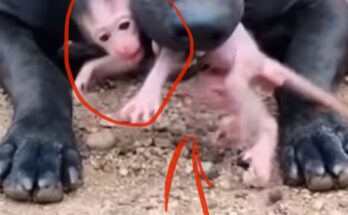In the dense canopies of tropical forests, where survival depends on social structures and instincts, a heartbreaking scene unfolded that reminds us how complex—and at times, cruel—animal behavior can be. A young monkey, barely old enough to climb without trembling limbs, was severely beaten by an older member of its troop while its mother was away foraging. This shocking incident has sparked concern among animal behaviorists and wildlife enthusiasts alike.
Primates, like humans, are deeply social creatures. They form hierarchies, maintain social bonds, and care for one another. But these same social dynamics can turn brutal, especially when dominance, jealousy, or fear come into play. The attack on the infant monkey is not an isolated event; rather, it highlights a lesser-known but important aspect of primate behavior: intra-group aggression.
According to researchers, such attacks often stem from complex social tensions. Older monkeys may feel threatened by the attention a younger one receives, or they may be asserting their dominance in the absence of the mother. In some cases, these aggressive behaviors are attempts to shift the balance of power within the troop. The absence of a protective mother figure, even briefly, can create a dangerous power vacuum for vulnerable infants.
This incident also raises important ethical and conservation questions. As human encroachment continues to shrink natural habitats, primate troops are forced into tighter spaces with fewer resources. This scarcity can lead to increased stress, competition, and, ultimately, more frequent displays of aggression.
For those who observe monkeys only in zoos or as playful creatures in travel photos, this story may be shocking. However, understanding the full spectrum of their behavior—including the darker aspects—is crucial for truly appreciating the emotional depth and complexity of these animals. It also underscores the importance of protecting their natural habitats and supporting conservation efforts that reduce troop stress.
The young monkey, thankfully, survived the attack, though it sustained visible injuries. Local wildlife rescuers monitored the situation but opted not to intervene directly, citing the importance of allowing natural social dynamics to play out. Intervention in such tightly bonded communities can sometimes do more harm than good. Instead, the focus was placed on monitoring the troop’s behavior and ensuring the safety of the young one from a distance.
This incident is a sobering reminder that nature is not always gentle, even among species we perceive as intelligent and social. It challenges our assumptions and calls for a deeper respect for wildlife—one that acknowledges both the beauty and the brutality of life in the wild.
As conservationists and animal lovers, it’s essential we advocate not only for the survival of species but also for environments that foster safer, more stable social conditions. Only then can we hope to prevent such heartbreaking events in the future.



